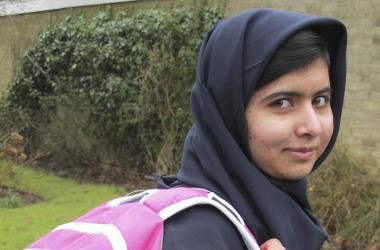Malala Yousafzai: Backlash Escalates As Private Schools In Pakistan Ban Her Book

The continuing backlash against Malala Yousafzai, the teenaged Pakistani girl who gained worldwide fame as an education activist after a Taliban gunman shot her in the head, has reached a new chapter in her homeland – private schools have banned her new autobiography and even accused her of serving as a “tool of the West.”
Over the past year, Malala has been feted by various prominent parties and entities in the west, including Queen Elizabeth of England, the European Union, the United Nations, and Harvard University, among others. She was even considered a nominee for this year’s Nobel Peace Prize.
However, the October publication of her new book, “I Am Malala,” (co-written by British journalist Christina Lamb) has only exacerbated suspicions in Pakistan that she is being used as a puppet by western forces to insult Islam and the eastern world as a whole. The fact that she received a huge advance for the book only made matters worse.
Ironically, educational officials in Pakistan (who work in the very segment of society that Malala wants to improve) have prohibited her memoirs from classrooms across the country. (Tens of millions of Pakistani children attend fee-based private schools since public schools are in such poor shape).
Adeeb Javedani, president of the All Pakistan Private Schools Management Association, told Associated Press that Malala's book will not be available in any libraries at its 40,000 affiliated schools. He also asked the government to ban it from all school curricula. "Everything about Malala is now becoming clear," Javedani said. "To me, she is representing the West, not us."
Kashif Mirza, the chairman of the All Pakistan Private Schools Federation (which represents more than 152,000 institutions across the country), has also banned the book from all schools under his group’s jurisdiction. "The federation thought we should review the book, and having reviewed it we came to the decision that the book was not suitable for our children, particularly not our students," said Mirza. "Pakistan is an ideological country. That ideology is based on Islam.... In this book are many comments that are contrary to our ideology." Mirza added that while Malala was a role model for children, this book has made her “controversial.” "Through this book, she became a tool in the hands of the Western powers," he said.
Mirza cited, among other things, that when she mentioned the Prophet Mohammed, she omitted the customary addendum “PBUH” (“Peace Be Unto Him”). In addition, Mirza complained that Malala’s tome also spoke favorably of Ahmadis, a minority religious sect that Pakistani law has declared to be “non-Muslims.” (Malala countered that they are indeed adherents of Islam). Malala further commended British-Indian author Salman Rushdie, who earned wrath across the Muslim world for his own controversial book “Satanic Verses.” Specifically, Malala said that although many Muslims found Rushdie’s novel offensive, she “believes strongly in the freedom of speech."
But Mirza also asserted that his group was dedicated to education women. "We run private schools in which more than 50 percent enrolment is of girls and an equal percentage of teachers is also female and we are striving for women empowerment and we stand by the movements and drive to give the denied rights to women" he told Pakistani media, "That doesn't mean that we will allow our children to toe Malala's line with severe attacks on our basic beliefs."
Not everyone in Pakistan supports the ban. "The decision to ban the book is the result of a deliberate smear campaign run against Malala and the book by right-wing commentators," said Bina Shah, novelist and education campaigner based in Karachi, according to Pakistani media. "There has been complete confusion about the book, sown very deliberately in the minds of adults because of this right-wing talk."
But students in the exclusive Bloomfield Hall School, in Lahore, had mixed views about Malala’s book. "The world already gets to hear a lot of corruption stories about Pakistan and this is only going to add to that same image," said a student named Zonash Raza. Another student, Yumna Afzal, defended the book and Malala. "The decision [to ban the book] is completely wrong and it is a conspiracy to show Malala as a U.S. puppet," she said. "I have heard talk shows on TV where people are claiming Malala is fake and the injuries she received are not real, but I really don't agree with them. She is a hero and an inspiration."
© Copyright IBTimes 2024. All rights reserved.











